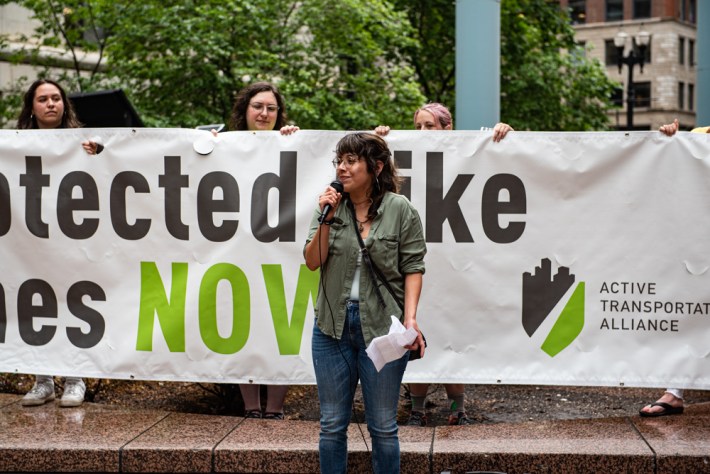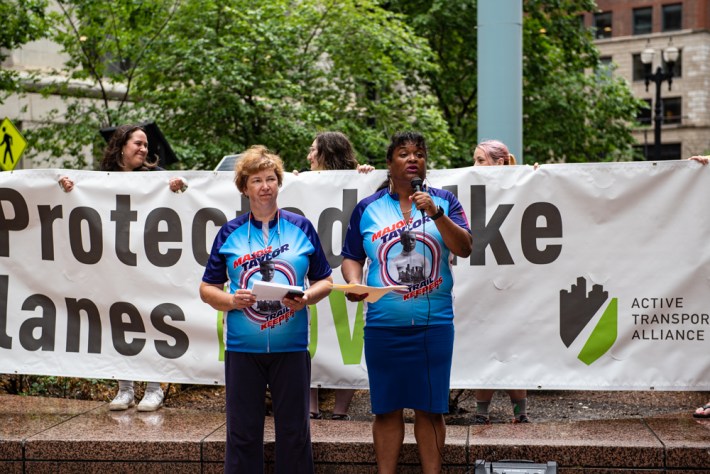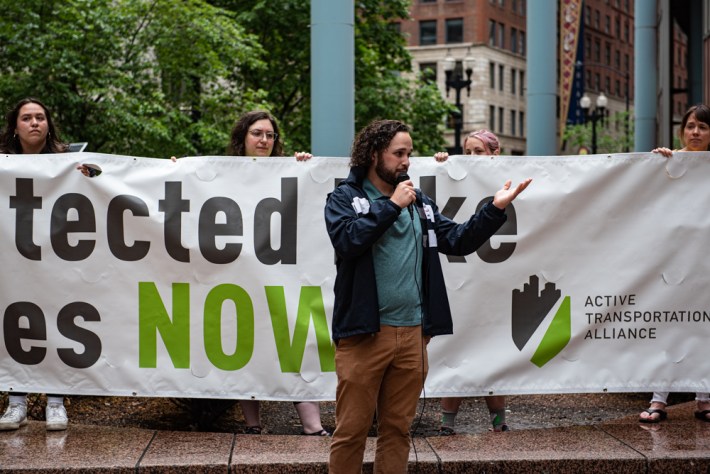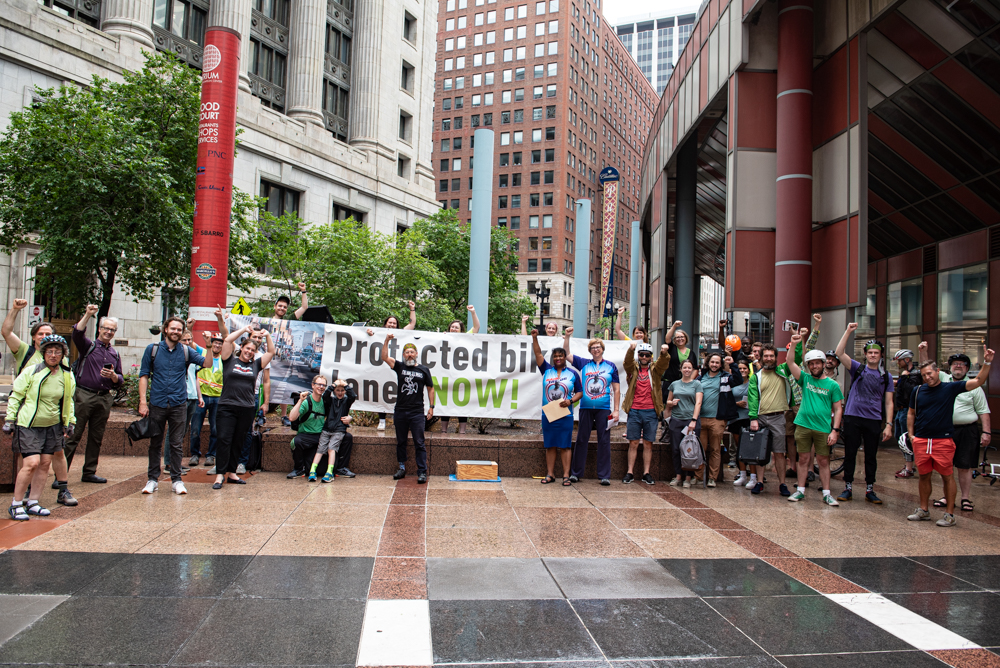Last Friday, wet weather didn't keep dozens of sustainable transportation and public health advocates, as well as the loved ones of fallen cyclists, from showing up for an Active Transportation Alliance-led rally for protected bike lanes. The demonstration, the kickoff for Chicago Bike Week, presented by FK Law (a Streetsblog Chicago sponsor), took place in the plaza of the Thompson Center. That iconic building was designed by architect Helmut Jahn, 81, who was fatally struck on his bike on May 8 in suburban Campton Hills.
The event, which coincided with the tenth anniversary of the opening of Chicago's first protected bike lane on Kinzie Street, was an effort to draw attention to the city's slow progress in building a cohesive network of safe, low-stress bikeways, and spur elected officials to pick up the pace. Attendees were encouraged to wear green, the color of many of Chicago's protected lanes.
ATA has noted that the Chicago Department of Transportation's Streets for Cycling Plan 2020 envisioned a 645-mile citywide bike network that would accommodate riders of all ages and abilities. However, less than 15 percent of the recommended bikeway mileage was built over the last nine years. More info on that subject here.

Here's what some of the speakers at the rally had to say about the issue. "When I think about what would make cycling easier around the city, it’s protected bike lanes," said Ruth Rosas, program manager at Consortium to Lower Obesity of Chicago’s Children. She stressed that there needs to be fair geographic distribution of bikeways across the city. "A lot of people on the South and West sides who ride bikes are often neglected and ignored. When we build protected bike lanes, we want to make sure that they are built for people of all ages and abilities and especially we want to make sure that people in marginalized communities are able to access them.”
Thanks to tireless lobbying from advocacy groups like Riverdale-based We Keep You Rollin', CDOT said it installed 59 percent of last year's new bikeways on the Far South Side.

Dr. Brenda Dixon, president of Major Taylor Trail Keepers Chicago, and vice president of Friends of the Major Taylor Trail, argued that “Our bicycling infrastructure has not kept up. The money is there. We need to demand that we have protected bike lanes. And we want them now, not ten years from now.”
Anne Alt, president of the Chicago Cycling Club, and secretary of Friends of the Major Taylor Trail, acknowledged that the Far South Side has seen many bike improvements in recent years, but still has major gaps in the bike network. "More people want to ride and they want to get where they’re going in one piece, and the Major Taylor Trail is part of many of those trips. Safe connections to the trail and many other destinations on the south side and across the entire are needed now, not tomorrow, now.”
Alt added that people who ride bikes in Riverdale, the most isolated part of the city, including We Keep You Rollin' members, want safe routes to reach the Major Taylor Trail and other destinations. "Right now they don’t have a safe way to ride anywhere outside their neighborhood. We’ve recognized that need years ago – it’s in the Streets for Cycling plan – and nothing has been built. When will there be infrastructure to get those riders where they need to go? They need it now.”
Brendan Kevenides from FK Law noted that all Chicagoans should be able to travel through the city safely, affordably, and with dignity. "This is what we want, this is what we need, and this what we deserve and this why we are here today. How do we achieve this important goal? We achieve it with a complete network of protected bike lanes. What does that mean? It means bike lanes that offer real protection from motor vehicles for everybody." Kevenides argued that painted bikeways and flexible plastic posts are insufficient to provide that kind of physical protection, but instead curb protection is needed to prevent motorists from entering the lanes.
Also speaking was Matt Portman, cousin of "School of Rock" drummer Kevin Clark, 32, who was fatally struck on his bike on May 26 at the complex, dangerous intersection of Logan Boulevard and Western Avenue in Logan Square. He was the second person killed while biking at that location in 13 years, also including the 2008 crash death of Tyler Fabeck, 22. In 2018 ATA and the Logan Square Neighborhood Association released a report calling for safety improvements to the junction, including a road diet, protected lanes, a new crosswalk, and better lighting, but city, county, and state officials took no action.
"A month ago today my cousin was having a normal evening just like any of us, and then that night on his way home he was taken from this world on his bicycle," Portman said. "He was hit by a [driver] at one of the most notoriously horrible intersections in Chicago, at Logan and Western. And as hard it is to lose anyone, and to lose anyone that young, and anyone as special as Kevin Clark was, it has been so much harder to know that anybody who lives near that intersection... knows how horrible that intersection is. And even our representatives around us know how horrible that intersection is. Lori Lightfoot lives very close to that intersection and knows how horrible it is."
Portman noted that ATA and LSNA had created "an amazing plan" three years ago to fix the intersection. "It's just one of... miles and miles of road that we are long overdue on making safer for all of us. And to know that [officials] were just gift-wrapped a wonderful plan that was signed off on by the people who know safe biking best, by the people who know the neighborhood best, and did nothing about it? It has added so much to an already painful experience... It just sucks."
"So for me, for my family, for everybody in Logan Square, and everybody in this city, please, just take some action," Portman urged our leaders. "We deserve safer streets. Chicago is a beautiful place to bike. It's totally flat. We have our amazing lakefront that people come from all around the world just to bike in Chicago, and they should have that kind of safe biking all around our city."

"There is absolutely no one that it hurts, and absolutely everyone in the city that it helps if we have safe biking lane," Portman noted. "It helps the workers getting to work, it helps their employers. It helps people coming to visit Chicago to get around our city."
Portman concluded by thanking the advocates for showing up to the rally. “Please keep it up. Keep making that noise. And keep letting [officials] know that it is not enough, that they keep making promises, and they need to deliver more, because the money's there, the knowledge is there, and they just need to do it, they just need to take action. It's now 30 days later and still nothing has changed at that intersection... So let's keep making noise , and keep all of our advocacy together, and I know that at a certain point they'll listen to us, and we will get this done."






